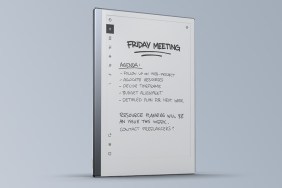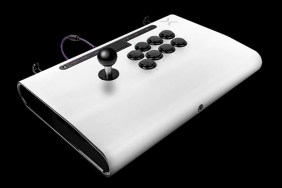Is that a choose-your-own-adventure book in your pocket?
Ah, the Dorito-festooned, Mountain Dew-fueled, 8:00 PM-to-8:00 AM board game and role-playing game session—often an escape from and substitute for a normal social life. Just you and four or five of your most dork-tastic coevals, locked in an imaginative struggle with orcs, trolls, and wizards (instead of a real struggle with, say, members of the opposite sex).
[image1]But Zork knows—sometimes, even such an intimate gaming session is still just too much of a social endeavor. Enter the ‘choose-your-own-adventure book’, a prepared gamebook journey designed for a single participant; the form isn’t unknown the in U.S., but it didn’t exactly ‘catch on’ either. However, things went rather differently in the U.K. and Europe: The Fighting Fantasy books co-created in the early ’80s by Steve Jackson—not that one, but this one—and Ian Livingstone took the solo-adventure-book/module approach to the next level in an impressive run of some 70 books. They integrated Dungeons & Dragons-style die-rolling for character generation, combat resolution, and other mechanics (which in a regular tabletop role-playing session would be handled by a living, breathing Dungeon Master). Prime material to be mined for a solo-adventurer video game, you might say—and you’d be right.
Apyr’s forthcoming Fighting Fantasy: The Warlock of Firetop Mountain aims to join the ranks of a club that is still fairly exclusive: The full-blown, first-person action game for Nintendo DS. As with the portable creep-fest Dementium and the science-fiction shooter Moon, Fighting Fantasy lets players control the point-of-view action with movement via the D-pad, while the mouse-look is handled via the stylus. Alternately, players whose control habits are more classically-rooted can even opt to use the DS’s right-side buttons to handle the look function, which definitely takes some getting used to – but then, the same could be said for the stylus-based scheme, which can give even an 18-DEX DS owner some strange hand cramps over extended gaming sessions.
Since the D-pad (and/or the face buttons) are already dedicated to movement and aiming, you’ll fight strictly with the shoulder buttons, timing your strikes as enemies close in and make themselves vulnerable. The remainder of game functions – managing your considerable inventory of weapons, consumables, and elementally-branded types of magic, as well as attributes and skills – are all handled via the DS’s touch-screen. Shields, like different types of personal armor, are treated as passively functional, so there’s no need to ‘assign’ your defensive gear to this or that hand. Find yourself a sword of other weapon, get an enemy in your P.O.V. Sights, and start slashing away.
[image2]One of the first things I noticed about this first-person RPG, even at this pre-release stage, was the game’s sheer good looks—not only is it one of the few such first-person DS games due out in the near future, but it runs at a solid, smooth 60 frames per second. While not quite as elaborate in the sound department, the game will also feature a musical score that justifies connecting some headphones (or even, as was the case in my demo, an external speaker setup). The game’s perennial soundscape also includes the clash of melee weapons, the sound of your footfalls, the grunts and strikes of the many enemies you’ll mow down in the course of your adventure, and occasional mood-setting moan or shriek in some of the more ominous dungeon-chambers.
Character development is completely open-ended, so you’re not nailed down to the typically restrictive character classes or abilities so often found in role-playing video games. If you start the game by going down the bruiser/melee fighter path—as you probably should, at least for a while—and later discover that your true in-game calling is rooted in spell-casting, feel free to go nuts and start switching your points up on the skill tree.
As with any proper role-playing game, Fighting Fantasy makes use of the expected statistics for unique player-characters—hit points, magic points, level, stamina (the ability to absorb damage), intuition (a measure of your potential magical prowess), and that old favorite, the catch-all Luck statistic. Abilities come in both active and passive varieties, either functioning all the time in the background or waiting for the player to trigger them in battle (such as a special Berserk attack for players who tend toward the melee fighter approach).
Just to better tweak the overall experience, players are presented with a series of questions at the outset to help nudge their characters (and thus the game in general) in the desired direction—perhaps you want to play as the low-frills ‘tank’ fighter, the perceptive character that has a better chance of spotting and disarming traps, a skilled magic user, or what have you.
[image3]Magic is broken down not only along the expected elemental lines (fire, water, electricity), but also into broad classes of magic. These include Light, healing/restoration spells; Shadow, ‘neutral’ magic for cancelling out other spells, disarming traps, etc.; Witchcraft, for poisons and curses; and Dark, for sending enemies out into the void and other particularly-nasty methods of disposal.
The game provides both strategic-level (world) maps as well as local-environment maps; one nifty function lets players make notes directly onto the lower touch-sensitive screen. Just take your stylus in hand and jot down, in your own terrible handwriting, precisely where that dwarf was, what he was offering you, and/or anything you might have done in recent memory to piss him off.
Fighting Fantasy also features dice gambling and lock-picking mini-games; the upper screen displays a cross-sectional view of the lock in question, and careful movements of the stylus on the lower screen determine whether you safely disarmed the lock/trap in question…or whether the whole endeavor has just blown up your face (perhaps literally). In addition to a don’t-touch-the-sides Operation-style mechanic, there are cylinders that rotate in real time, requiring you to keep the stylus moving steadily. Passive skills in lock-picking can aid in these timed mini-games by giving precious extra seconds on the clock.
Even when your real-world role-playing droogies are down for the count with swine flu, pink eye, or a bad case of ‘Azathoth’s Revenge’, your DS is still there for you. Fighting Fantasy: The Warlock of Firetop Mountain is slated for release in mid-October. Even if your so-called ‘friends’ puss out on you for Halloween, too, you’ve still got a backup plan, right there in your hands.
You might want to check out this game, too.











